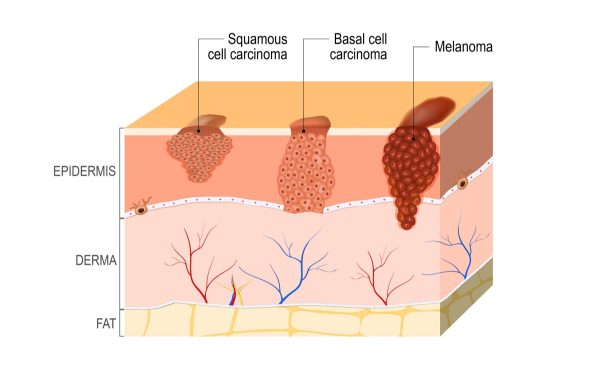
Skin cancer is the abnormal growth of skin cells, most often develops on skin exposed to the sun. This common form of cancer can also occur on areas of the skin not ordinarily exposed to sunlight.
Skin cancer is a disease in which malignant (cancer) cells form in the tissues of the skin. Different types of cancer start in the skin. Skin color and being exposed to sunlight can increase the risk of basal cell carcinoma and squamous cell carcinoma of the skin. Basal cell carcinoma, squamous cell carcinoma of the skin and actinic keratosis often appear as a change in the skin.
Tests or procedures that examine the skin are used to diagnose basal cell carcinoma and squamous cell carcinoma of the skin.
Types of Skin Cancer
- Basal Cell Carcinoma – usually occurs in sun exposed areas of the body such as neck or face.
- Pearly or waxy bump
- Flat, flesh-colored or brown scar-like lesion
- Bleeding or scabbing sore that heals and returns
- Melanoma – can develop anywhere on the body, in otherwise normal skin or in an existing mole that becomes cancerous.
- Large brownish spot with darker speckles
- Mole that changes in color, size or feel or that bleeds
- Painful lesion that itches or burns
- Small lesion on the palms, soles, fingertips or toes, or on mucous membranes lining the mouth, nose, vagina or anus
- Squamous Cell Carcinoma – occurs on sun-exposed areas of the body, such as face, ears and hands. People with darker skin are more likely to develop squamous cell carcinoma in areas that aren’t often exposed to the sun.
- firm , red nodule
- Flat lesion with a scaly, crusted surface
Common Risks Factors for Skin Cancer
- Fair Skin
- A history of sunburns
- Excessive sun exposure
- Sunny or high-altitude climates
- Moles
- Precancerous skin lesions
- Family history of skin cancer
- Personal history of skin cancer
- Weakened immune system
- Exposure to radiation
- Exposure to certain substances
Treatments
- Freezing – doctor may destroy actinic keratoses and some small, early skin cancers by freezing them freezing them liquid nitrogen (cryosurgery)
- Excisional Surgery – this type of treatment may be appropriate for any type of skin cancer.
- Mohs Surgery – this procedure is for larger, recurring or difficult-to-treat skin cancers, which may include both basal and squamous cell carcinomas.
- Curettage and Electrodesiccation or Cryotherapy – after removing most of a growth, the doctor scrapes away layers of cancer cells using a device with a circular blade.
- Radiation Therapy – uses high-powered energy beams, such as X-rays, to kill cancer cells.
- Chemotherapy – drugs are used to kill cancer cells.
- Photodynamic Therapy – destroys skin cancer cells with a combination of laser light and drugs that makes cancer cells sensitive to light
- Biological Therapy – uses the body’s immune system to kill cancer cells.
What We Offer
We at Almurshidi Medical Tourism will find the best doctors and hospitals to cater all your needs. We are partnered with a wide network of hospitals and clinics that provide top quality medical experience.
We provide free medical estimates, make appointments, and provide several medical opinions if needed at no cost.
Contact Us
For more information contact us at +66822004040 or via WhatsApp





